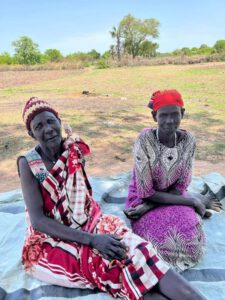It is crucial to understand that scattered villages across South Sudan rely solely on traditional midwives during pregnancy and birthing. Due to a shortage of conventional midwives, South Sudan’s childbearing women have no access to traditional midwifery during pregnancy and delivery of their babies.
The two women featured in the photograph are traditional, volunteer midwives from Gogrial West. These women, despite their lack of access to obstetric tools, believe that it is their duty to help women in their communities during pregnancy and birth, stating that: “The major problem making our work difficult is a lack of access to obstetric tools, medicines, nutritious food, and most importantly, clean water.”
Gogrial is an isolated village without roads, or medical clinics, and the absence of clean water significantly contributes to many preventable pregnancy and birthing-related deaths and complications. Key underlying causes for these deaths and complications include underage marriage, and the federal government’s inability to improve South Sudan’s infrastructure for healthcare, education, power supply, and transportation and employment opportunities. These, and other factors, sustain South Sudan’s widespread illiteracy and poverty, and lack of stable access to food.
CIMISS’s mission is to collaborate with local populations to improve access to health-related education, and to increase the ranks of midwifery through organized training, networking, and stable access to integral obstetric tools. By engaging in discussions in local languages, and partnering, we can begin to bridge healthcare gaps and reduce preventable deaths in hard-to-reach communities across South Sudan. With this concerted effort, we can bring about a positive change and inspire optimism, engagement and support. You can help by donating money, providing midwifery kits, and volunteering for CIMISS to help us reach our goal.

